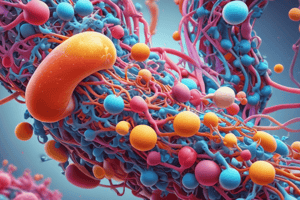Podcast
Questions and Answers
What primarily activates the Cori cycle?
What primarily activates the Cori cycle?
- Elevated lactate levels in the bloodstream (correct)
- Low blood pressure conditions
- High levels of insulin in the bloodstream
- Increased glucose availability in the liver
Which hormone primarily stimulates gluconeogenesis in the liver?
Which hormone primarily stimulates gluconeogenesis in the liver?
- Cortisol
- Adrenaline
- Glucagon (correct)
- Insulin
What effect does insulin have on gluconeogenesis during intense exercise?
What effect does insulin have on gluconeogenesis during intense exercise?
- It completely prevents gluconeogenesis from occurring
- It has no effect on gluconeogenesis
- It may be blunted, allowing gluconeogenesis to proceed (correct)
- It enhances gluconeogenesis significantly
How does cellular energy status influence the Cori cycle?
How does cellular energy status influence the Cori cycle?
Which of the following factors can influence liver function regarding the Cori cycle?
Which of the following factors can influence liver function regarding the Cori cycle?
Which of the following metabolic factors can be used as substrates for gluconeogenesis?
Which of the following metabolic factors can be used as substrates for gluconeogenesis?
What primarily activates the pentose phosphate pathway (PPP)?
What primarily activates the pentose phosphate pathway (PPP)?
How does the NADPH/NADP+ ratio affect the regulation of the PPP?
How does the NADPH/NADP+ ratio affect the regulation of the PPP?
Which hormone is known to stimulate the pentose phosphate pathway in insulin-responsive tissues?
Which hormone is known to stimulate the pentose phosphate pathway in insulin-responsive tissues?
What determines the overall regulation of gluconeogenesis?
What determines the overall regulation of gluconeogenesis?
Which of the following statements is true regarding the pentose phosphate pathway?
Which of the following statements is true regarding the pentose phosphate pathway?
Which factor does not significantly influence the activity of the pentose phosphate pathway?
Which factor does not significantly influence the activity of the pentose phosphate pathway?
What is the primary energy-producing pathway for fatty acids?
What is the primary energy-producing pathway for fatty acids?
What is the primary energy source produced through beta oxidation?
What is the primary energy source produced through beta oxidation?
Which molecule is not produced during the beta oxidation of fatty acids?
Which molecule is not produced during the beta oxidation of fatty acids?
Which process is necessary for fatty acids to undergo beta oxidation?
Which process is necessary for fatty acids to undergo beta oxidation?
What role does the carnitine shuttle play in fatty acid metabolism?
What role does the carnitine shuttle play in fatty acid metabolism?
Which of the following hormones promotes gluconeogenesis?
Which of the following hormones promotes gluconeogenesis?
What happens to the acetyl-CoA produced from beta oxidation?
What happens to the acetyl-CoA produced from beta oxidation?
Which factor does not directly influence the regulation of beta oxidation?
Which factor does not directly influence the regulation of beta oxidation?
Which of the following best describes the overall reaction of beta oxidation?
Which of the following best describes the overall reaction of beta oxidation?
Flashcards are hidden until you start studying
Study Notes
Beta Oxidation
- Metabolic pathway located in the mitochondria that breaks down fatty acids into acetyl-CoA.
- Acetyl-CoA enters the citric acid cycle, generating energy.
- Key Steps:
- Activation of fatty acids: Forms fatty acyl-CoA using ATP.
- Transport: Fatty acyl-CoA is transported into mitochondria via the carnitine shuttle.
- Beta oxidation cycle: Cleaves two-carbon units (acetyl-CoA) from fatty acid chains, producing NADH and FADH2 for ATP production.
- Acetyl-CoA utilization: Enters the citric acid cycle for further ATP production.
- Significance:
- Primary energy source during fasting or low carbohydrate intake.
- Provides substrates for synthesizing fatty acids, cholesterol, etc.
- Regulated by hormones such as insulin and availability of fatty acids.
- Overall Reaction:
Fatty acyl-CoA + NAD+ + FAD + CoA-SH → Acetyl-CoA + NADH + FADH2 + CoA-SH
Gluconeogenesis Regulation
- Critical for maintaining blood glucose levels during fasting or low carbohydrate intake.
- Hormonal Regulation:
- Glucagon: Stimulates gluconeogenesis by activating enzymes during low blood sugar.
- Cortisol: Increases amino acid availability for glucose conversion.
- Insulin: Inhibits gluconeogenesis under high blood sugar conditions.
- Metabolic Factors:
- Lactate: Produced during anaerobic glycolysis, convertible to glucose in the liver.
- Amino acids: Serve as substrates for gluconeogenesis from protein breakdown.
- Fatty acids: Can be converted to glucose under specific conditions.
- Regulation is complex, adapting to physiological conditions and metabolic states.
Pentose Phosphate Pathway (PPP)
- Primarily regulated by substrate availability, NADPH/NADP+ ratio, and hormonal signals.
- Substrate Availability:
- High glucose-6-phosphate concentration activates the PPP.
- Requires NADP+ to facilitate oxidative reactions.
- NADPH/NADP+ Ratio:
- High NADPH/NADP+ ratio downregulates PPP; low ratio upregulates to enhance NADPH production.
- Hormonal Signals:
- Insulin: Stimulates PPP in insulin-responsive tissues like adipose tissue and muscle.
- Glucagon: Inhibits PPP activity in the liver.
- Activity influenced by cellular needs, e.g., increased demand for NADPH during fatty acid synthesis.
Cori Cycle
- Regulates recycling of lactate into glucose, crucial for blood sugar maintenance.
- Lactate Availability:
- Activated during increased lactate levels from intense exercise or low oxygen availability.
- Lactate moves from muscle cells to the liver for gluconeogenesis.
- Hormonal Regulation:
- Glucagon: Stimulates gluconeogenesis for lactate conversion in the liver.
- Insulin: Inhibits gluconeogenesis but may not fully suppress during high-energy demands.
- Additional Factors:
- Cellular energy status influences lactate production and cycle activity.
- Liver metabolic state affects its capacity to convert lactate into glucose.
- The cycle ensures efficient glucose production from lactate, especially in anaerobic conditions.
Studying That Suits You
Use AI to generate personalized quizzes and flashcards to suit your learning preferences.




